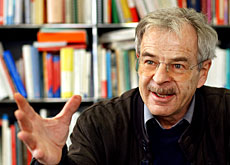
Voters face “un-Swiss” election campaigns

The main parties' campaigns ahead of October's federal elections have been marked by a new, more aggressive tone, political expert Wolf Linder tells swissinfo.
The battle for voters is so hard-fought that some parties are even sweeping aside the traditional Swiss political principles of moderation and consensus.
The campaign has been gathering pace in the past fortnight with allegations by the rightwing Swiss People’s Party that its opponents were plotting to oust party leading light and Justice Minister Christoph Blocher.
The People’s Party has already been accused of racism over its “black sheep” posters which advocate the deportation of foreign criminals.
Linder says greater polarisation between the political left and right is a main feature of this electoral campaign and is also a sign of a change in style on the political scene.
swissinfo: How different is this electoral campaign to earlier ones?
Wolf Linder: The tone has become harsher, but also rougher. I’m thinking here of the People’s Party, which has overstepped over the mark with its posters where the [white] sheep throw the black sheep out of Switzerland.
But it’s a similar story with the [centre-left] Social Democrats as one of their posters shows a plane crashing into a nuclear power plant. These are examples of things which have really overstepped the mark compared with the usual political style.
swissinfo: Why has the political style changed in this way?
W.L.: There are several different reasons. The People’s Party is regarded as the party which goes for taboo subjects and has a confrontational style in general.
Added to this is the element of political populism – the party always ridicules those institutions in which it would really like to have more influence.
swissinfo: Unlike politicians in other countries, those who were opponents during campaigning in Switzerland then have to work together under the consensus system. How do politicians manage this balancing act?
W.L.: The parties are indeed having to engage in a political balancing act. They are governing parties but at the same time they also want to target and mobilise their voters.
The parties resolve the situation over time – it’s nothing new that during campaigning consensus politics is banished to the back room and it’s each person for his or herself. Afterwards everyone plays by the rules again.

More
Consensus politics and power-sharing
swissinfo: The People’s Party is dominating the electoral run-up. Why is no one able to challenge them?
W.L.: The People’s Party is running a sharp electoral campaign and wants to mark itself out through polarisation. The Social Democrats are also going a little bit in this direction.
But the centre parties [the centre-right Radicals and Christian Democrats] can’t really benefit from polarisation and must instead hope for political common sense on the part of the voters.
It simply wouldn’t be right for them to be too aggressive or make unrealistic demands.
swissinfo: The electoral campaign has been marked by parties attacking each other, not always in a very tasteful way. Are the parties’ campaigns lacking in content and substance?
W.L.: On a national level it is certainly the case that superficial arguments are dominating the agenda. In fact there are really only a few politicians who are raising important topics. But I am amazed at how current and important subjects are being left out.
There are hardly any arguments and counterarguments being brought to important issues in national politics – everybody is bringing up their own issues and no one is countering them.
There are often far more interesting discussions at cantonal level – on schools, traffic issues or on the integration of foreigners. This is because the national campaign is traditionally marked by local issues.
swissinfo: What are you expecting to happen at the elections?
W.L.: The question is whether voters will continue to accept the polarisation of the past ten years or whether they have had enough.
If they continue to accept it, the People’s Party will certainly not do any worse than [in the elections] four years ago. The Social Democrats should also do all right. The middle ground will be eroded, perhaps at the expense of the Greens.
If voters have started to have enough, the centre parties will come out of the elections stronger.
swissinfo: A record number of Swiss abroad are standing for election. Could a candidate be elected?
W.L.: It could happen. However, this is most likely to happen in a large canton such as Zurich. The Swiss abroad are an important body of voters, but in most cantons there are too few of them to come through under our system of proportional representation.
swissinfo, based on a German interview by Christian Raaflaub
Latest opinion poll:
Swiss People’s Party: 25.6% (26.7% in 2003)
Social Democratic Party: 22.6%% (23.3%)
Radical Party: 14.7% (17.3%)
Christian Democratic Party: 15% (14.4%)
Green Party: 10.7% (7.4%)
Expected turnout: 55% (45.4%)
On October 21 the Swiss will vote at home and abroad in the parliamentary elections. 200 seats are being contested in the House of Representatives and almost all of the 46 seats in the Senate.
Voters can only vote for a candidate listed in their canton. The Swiss abroad must also cast their ballot for their registered home canton. Some Swiss abroad are candidates for the House of Representatives.
The elections can have a big influence on the make up of the cabinet. The new parliament’s first task will be to either approve the whole cabinet as it is or to reshuffle it.

In compliance with the JTI standards
More: SWI swissinfo.ch certified by the Journalism Trust Initiative




























You can find an overview of ongoing debates with our journalists here . Please join us!
If you want to start a conversation about a topic raised in this article or want to report factual errors, email us at english@swissinfo.ch.